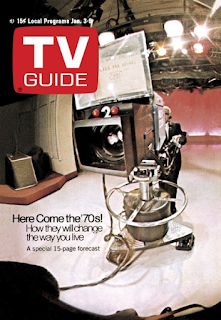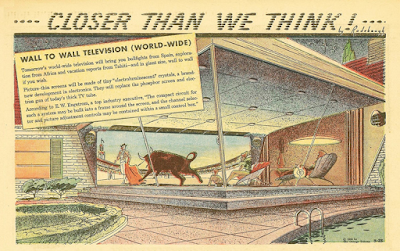This week in TV Guide: January 3, 1970
 It's not only the start of a new year, it's a whole new decade, and something about the 1970s seems to contain the promise of exciting, dynamic change. After all, we've already landed on the moon; can the world of The Jetsons be far behind? TV Guide takes advantage of the occasion to devote this entire issue to a look at what the future has in store; namely, "a startling communications revolution that will change the way you live." Three of TV Guide's best—Neil Hickey, Richard K. Doan and David Lachenbruch—have talked with experts to find out more about this Communications Revolution: what it entails, and how it will "alter life in America." For the most part, their predictions have come true—not all of them in the decade of the '70s, and not all of them in the way that was forecast, but I think you'll agree that their view of the future is at least as good as that of, say, Gene Roddenberry.
It's not only the start of a new year, it's a whole new decade, and something about the 1970s seems to contain the promise of exciting, dynamic change. After all, we've already landed on the moon; can the world of The Jetsons be far behind? TV Guide takes advantage of the occasion to devote this entire issue to a look at what the future has in store; namely, "a startling communications revolution that will change the way you live." Three of TV Guide's best—Neil Hickey, Richard K. Doan and David Lachenbruch—have talked with experts to find out more about this Communications Revolution: what it entails, and how it will "alter life in America." For the most part, their predictions have come true—not all of them in the decade of the '70s, and not all of them in the way that was forecast, but I think you'll agree that their view of the future is at least as good as that of, say, Gene Roddenberry.Your Home Wired for Sight, Sound. This will come primarily from cable TV, which will still be in its infancy during the '70s, but will eventually provide most American homes with 50 or 75 channels, providing not only minority-interest programming, but "handing the family's varied needs via special hook-ups with stores, ban, airlines and post offices; plugging into college-credit courses for home study; reading the day's newspapers off the face of the tube and receiving automatic print-out copies of pages one wishes to preserve; tapping the almost infinite resources of computer-fed storage banks for data on every imaginable subject." In other words, the internet.
The World Will Become a Village. Satellites will unite the world's communications systems, and I don't think anyone would disagree that this has come true; predictably, however, TV Guide's experts saw this as providing more than entertainment, thinking of the potential for world leaders to hold joint summits on vital issues with the world's viewers tuning in. However, notes Comsat's Dan Karasik, "By the end of the 1970s, I can't think of an event of any importance that won't be on television world-wide." True dat.
Add ERV, SV to Your Stock of Initials. What does this mean? For ERV and SV, substitute DVR. Check another one off the list of correct predictions. One expert predicted that eventually, "TV cartridges may be sold as paperback books or phonograph records are sold today." They also think the TV will be used to transmit things called "facsimiles," which are already widespread in business. I think this might be one area in which technology moved even faster; I had a fax machine at home, but by the time it became practical for everyone, email attachments might already have taken their place.
 Programming? A Mystery. Prime time movies might be cutback due to a shortage of Hollywood features that can be shown on TV (because of their sex and language content). Because of the cyclical nature of programming trends, formats that are currently on the outs, such as crime shows, Westerns, and action-adventure dramas, will likely come back. Well, got 'em al; except the horse operas. Here's one that's flat-out wrong, although we couldn't have known it at the time: NBC's program head Mort Werner says TV will never reach the levels of violence it had before, say, RFK's assassination; and that the networks will never adopt the BBC formula of series running for limited lengths of, say, 12 weeks. And here's one that's right, but for the wrong reason: TV viewing will decline sharply—they say it will be due to bland programming, but they couldn't possibly have known about social media.
Programming? A Mystery. Prime time movies might be cutback due to a shortage of Hollywood features that can be shown on TV (because of their sex and language content). Because of the cyclical nature of programming trends, formats that are currently on the outs, such as crime shows, Westerns, and action-adventure dramas, will likely come back. Well, got 'em al; except the horse operas. Here's one that's flat-out wrong, although we couldn't have known it at the time: NBC's program head Mort Werner says TV will never reach the levels of violence it had before, say, RFK's assassination; and that the networks will never adopt the BBC formula of series running for limited lengths of, say, 12 weeks. And here's one that's right, but for the wrong reason: TV viewing will decline sharply—they say it will be due to bland programming, but they couldn't possibly have known about social media.The News: Space May Be The Story. Not outer space, but the amount of space devoted to news on the networks. Most experts see news expanding, but nobody predicts all-news cable stations. And actually there is a lot of talk about the space program and how it will be covered; live pictures of Mars and Venus will come from unmanned vehicles, and activities on space stations will be covered heavily. It's true that we'll be fascinated by the pictures coming from Mars and beyond, but they're wrong that manned space exploration "seems secure, at least through Apollo 20, by which time the astronauts will be staying on the moon for days at a stretch, and chugging over the lunar surface in vehicles." Yes, but if you can't remember Apollo 20, you're not alone...
Public TV 's Future Hinges on Funds. Duh. Although John Macy, head of the Corporation for Public Broadcasting, thinks it would be swell to have Senate and House sessions opened to TV cameras. They have been, but again, nobody had expected C-SPAN.
We Must Move Information, Not People, Things. Very true. You don't need a library when you can call up books online, for example. This idea of bringing information to the people, rather than the other way around, will help alleviate traffic, overcrowding, and pollution. Even more important is the ability of individuals "to choose for themselves what they will know and with whom they will communicate." That's perhaps the truest statement of them all.
All in all, I'd say the future envisioned in this article has more or less come to pass. Now, as to whether or not it's a good thing, I'll leave that up to you.
Published on January 05, 2019 05:00
No comments have been added yet.
It's About TV!
Insightful commentary on how classic TV shows mirrored and influenced American society, tracing the impact of iconic series on national identity, cultural change, and the challenges we face today.
- Mitchell Hadley's profile
- 5 followers



